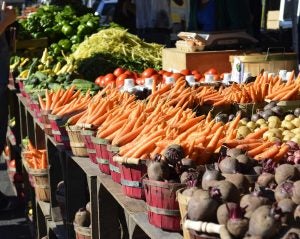You may have heard the old adage: “Eat your carrots, they are good for your eyes.” But as far as carrot facts go, it’s only sort of true. Just because you eat a lot of carrots will not be a reason your eyes suddenly get better.
Eating carrots can help the body manufacture vitamin A, which is necessary for the production of rhodopsin. What does that mean? This protein is essential for vision, especially in dim light. It’s important to include vitamin A in your diet for normal vision, but eating a lot of carrots won’t ultimately fix the solution at hand.

Carrots overall can help keep the eyes healthy. When you have a vitamin A deficiency there are many effects on the body, but it’ll be noticeable around the eyes, and you will potentially loose night vision.
Vitamin A is a key nutrient that promotes growth, prevents drying of skin, can enhance body’s ability to fight off bacterial infections, and can help maintain the digestive and urinary infections.
But if you eat too many carrots (or any root vegetable rich in beta carotene), your skin may turn an orange yellowish color.
It’s a real condition called carotenemia. It’s mostly harmless and would likely affect the palms and bottoms of your feet, and as always, the dose makes the poison. For this colorful root veggie, you’d have to eat over three large carrots a day at least for your skin to have any type of potential orange hue.
Interestingly, this nutritious root vegetable wasn’t always orange. It used to be grown in hues of purple, yellow, and white. Dutch carrot farmers started to grow the orange carrots in the 17th century when a strain was developed that contained higher amounts of beta carotene. In fact, it has a correlation with one of their leaders at the time, England’s William III, who was widely known as William of Orange.
Overall, carrots offer numerous benefits, including being rich in nutrients that promote your health. Containing antioxidants, they can help protect your cells from damage, preventing conditions like heart disease and cancer.

In the grocery store there are many carrots to choose from. Baby carrots are just regular carrots that have been cut down and are a good choice for a snack that’s ready to eat.
After harvest, baby carrots will be washed in a diluted chlorine and water solution to eliminate any food-borne illnesses. Whole carrots with stems should be washed and peeled to remove any dirt or germs.
There are many ways to enjoy carrots, but a common misconception are the differences between organic- and conventionally produced carrots. Organic carrots are carrots grown without synthetic pesticides and will normally use natural pesticides instead such as copper-based products. Overall, organic carrots growers tend to be grown less efficiently than conventional ones, and there usually is less uniformity.

No matter the production method, carrot growers are likely using a very minimal amount of pesticides. Spraying chemicals on the crop is costly, but the grower knows if they don’t, the amount of carrots harvested at the end of the growing season can be impacted. Carrot rust flies, leaf blight, aster yellow disease, and parsley worms all cause damage to the crop, pointing to the reason why different types of growers generally need to use some kind of protective product.
Carrots often take about two to four months to mature, and because they can be planted at various points during spring and summer, there’s a lot of opportunity for harvests for several months.
Carrots are overall healthy and include important nutrients like vitamin A, lutein, zeaxanthin, fiber, potassium, vitamin C, vitamin K, calcium, phosphorus, folate, and vitamin E. It won’t be the sole factor to help your eye vision, but it’s a nutritious product to enjoy fresh or in desserts. There’s a reason many call carrots the “perfect health vegetable.”
Michelle Miller, the “Farm Babe,” is an internationally recognized keynote speaker, writer, and social media influencer and travels full time to advocate for agriculture. She comes from an Iowa-based row crop and livestock farming background and now resides on a timber farm in North Central Florida.


